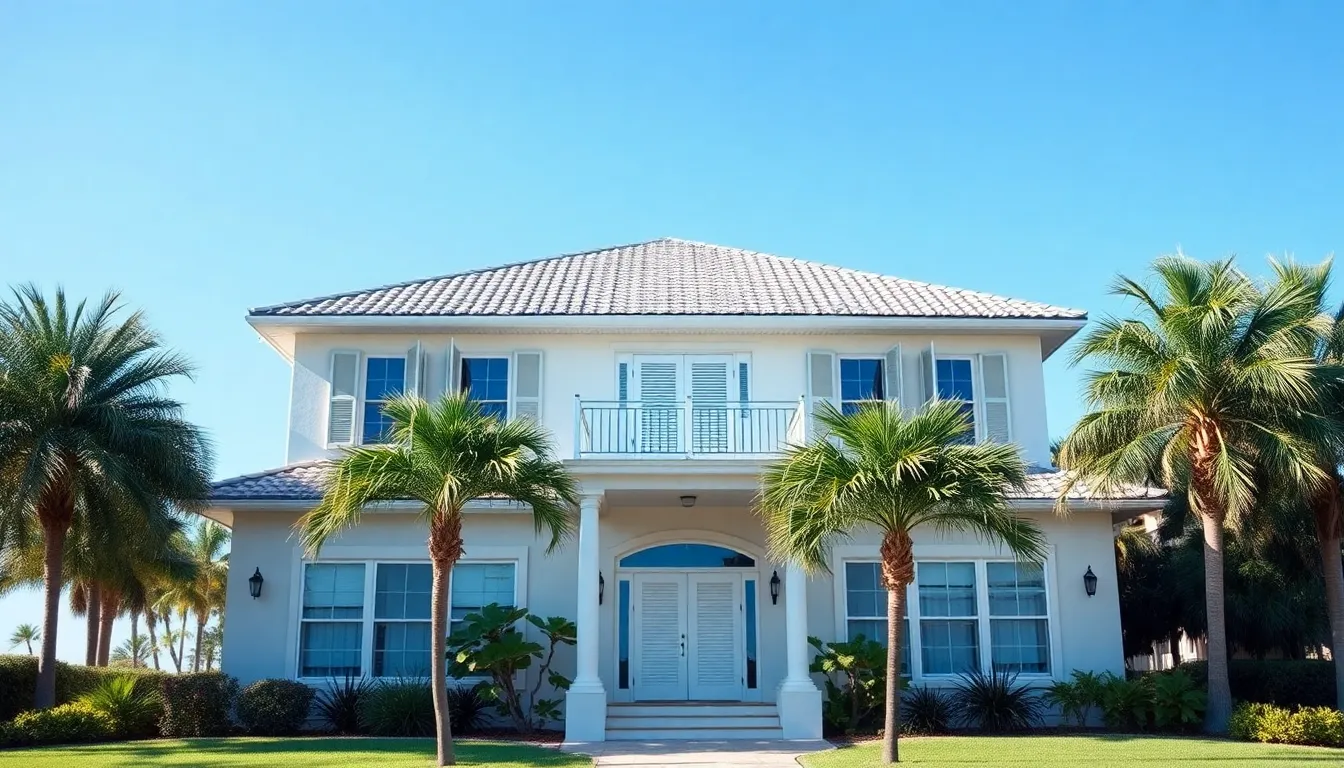When hurricane season rolls around, many homeowners find themselves asking a crucial question: does home insurance cover hurricane damage? It’s like asking if your favorite pizza place delivers during a thunderstorm—important to know before you find yourself in a pinch. With winds howling and rain pouring, the last thing anyone wants to worry about is whether their policy has them covered.
Navigating the world of home insurance can feel like trying to read a map in a storm. Policies can be as confusing as a cat in a dog park. Understanding what’s included in your coverage is essential to ensure you’re not left high and dry when disaster strikes. Let’s dive into the details, clear up the confusion, and find out if your home insurance is your trusty umbrella or just a flimsy raincoat.
Table of Contents
ToggleUnderstanding Home Insurance
Home insurance protects against loss or damage to a residence due to various events. Coverage often includes fire, theft, and vandalism, but specifics can vary by policy. Many homeowners discover that standard home insurance policies may not include coverage for natural disasters, particularly hurricanes.
Hurricane damage typically falls under two categories: wind damage and flood damage. Wind damage includes destruction caused by strong winds, while flood damage pertains to water entry resulting from heavy rainfall or storm surges. Standard home insurance policies often cover wind damage, but they might exclude flood-related losses.
Policyholders should examine their policies closely. Understanding the exclusions and limitations helps homeowners make informed decisions. Some homeowners opt for additional coverage options known as endorsements. Endorsements can provide extra protection against risks not covered in standard policies.
Flood insurance serves as a separate policy administered by the National Flood Insurance Program (NFIP). This program offers coverage specifically for flood damage. Homeowners in flood-prone areas might find this insurance essential for comprehensive protection.
Consulting with an insurance agent can clarify coverage options. Agents provide insights into available policies and additional coverages tailored to specific needs. They can answer questions regarding hurricane-related exclusions, ensuring that homeowners understand their coverage entirely.
Keeping records of home possessions is a smart practice. In case of damage, detailed inventories aid in filing claims efficiently. Documenting features and upgrades to the home also supports accurate claims processing.
Home insurance plays a vital role in disaster readiness. By understanding policy details and considering supplemental coverage, homeowners stand better prepared for hurricane impacts.
Types of Home Insurance Policies

Understanding the different types of home insurance policies helps homeowners select the right coverage for their needs, especially in hurricane-prone areas. Each policy type offers distinct protections, so knowing the details is crucial.
Standard Homeowners Insurance
Standard homeowners insurance typically covers various risks including fire, theft, and vandalism. This type of policy often includes coverage for wind damage, which can arise during hurricanes. However, it usually excludes flood damage, leaving homes vulnerable if nearby water sources overflow. Homeowners living in flood-prone regions should review their policies thoroughly. Consulting an insurance agent for additional endorsements offers tailored solutions. Ensuring the right policy in place provides peace of mind during storm seasons.
Special Perils Policy
A special perils policy covers a broad range of risks, except those specifically excluded in the policy document. Wind damage from hurricanes is generally covered, making this policy suitable for coastal homeowners. However, flood coverage often requires a separate flood insurance policy. Detailed policy reviews help homeowners identify specific exclusions and assess possible vulnerabilities. These policies offer flexible options to adapt to changing needs. Homeowners should weigh their risks based on geographical hazards when selecting a special perils policy.
Hurricane Damage Explained
Hurricane damage includes both wind and flood-related incidents. Understanding how each component is covered by home insurance is crucial for homeowners.
Wind Damage
Wind damage typically falls under homeowners insurance policies. Coverage applies when high winds from hurricanes cause roof damage, broken windows, or structural issues. Most standard policies include provisions for wind damage, making them essential for homeowners in hurricane-prone areas. It’s vital to note that deductibles might vary; higher wind deductibles could apply during hurricane season. Homeowners should examine their policies to ensure they understand the specific terms related to wind damage coverage. Consulting with an insurance agent can provide tailored advice, ensuring adequate protection.
Flood Damage
Flood damage often receives different treatment under home insurance. Most standard policies exclude coverage for flood-related incidents, especially in high-risk areas. Homeowners must consider obtaining separate flood insurance to protect against such risks. National Flood Insurance Program (NFIP) policies usually cover structural damage caused by floodwaters, offering significant support in extreme weather. Homeowners should evaluate their location’s flood zone designation to determine coverage necessity. Awareness of local flood insurance options can minimize potential financial losses resulting from a hurricane’s impact.
Home Insurance and Hurricane Coverage
Home insurance provides essential coverage against a range of risks, including hurricane damage. Understanding what is covered and what is excluded helps homeowners prepare for potential disasters.
What Is Typically Covered
Homeowners insurance often includes protection against wind damage caused by hurricanes. Coverage typically encompasses roof damage, broken windows, and structural issues resulting from high winds. Many policies also account for personal property destruction, so homeowners may recover costs for damaged possessions. Additionally, homeowners in hurricane-prone regions should verify their policies contain adequate wind damage clauses and confirm any specific limits or deductibles. During hurricane season, it’s essential to know the terms to ensure proper coverage.
What Is Excluded
Flood damage remains a common exclusion in standard homeowners insurance policies. Many policies specifically omit coverage for losses resulting from flooding, including those linked to hurricane-related storm surges. Homeowners must recognize that flood insurance typically requires a separate policy. Those in high-risk areas should especially consider additional flood insurance protection. Consulting with an insurance agent clarifies what coverage is necessary, especially concerning policies from the National Flood Insurance Program (NFIP) that cater to flood-related risks.
Factors Affecting Coverage
Understanding the factors that affect home insurance coverage for hurricane damage is essential for homeowners. These factors can significantly influence how well a policy protects against disaster.
Location of the Home
The geographical location of a home plays a crucial role in insurance coverage. Homes situated in coastal regions face higher risks from hurricanes. Such locations often prompt insurers to modify coverage options. Insurance premiums tend to increase for properties in high-risk areas. In fact, some insurers might even decline coverage or impose strict conditions. Homeowners should consider the risk level associated with their location when choosing a policy.
Policy Limits and Deductibles
Policy limits and deductibles determine the extent of coverage for hurricane damage. Homeowners should carefully review these amounts within their policies. A lower deductible means less out-of-pocket expense during claims, making it more attractive, especially after a hurricane. Conversely, higher deductibles often lead to lower premium costs but can complicate claims. Coverage limits also dictate the maximum amount the insurer will pay for damages, influencing overall financial protection. Homeowners must assess their needs and financial situation to choose the right policy structure, ensuring adequate protection against hurricane-related risks.
Homeowners must take proactive steps to understand their insurance coverage regarding hurricane damage. While standard policies often cover wind damage from hurricanes, flood damage typically requires separate coverage. This distinction is crucial for those living in flood-prone areas.
By reviewing their policies and considering additional endorsements, homeowners can better protect their investments. Consulting with insurance agents can provide tailored advice, ensuring that they have the right coverage in place. Being informed and prepared is essential for navigating the challenges that hurricanes may bring.


